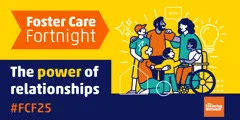Support our work
The Fostering Network is ambitious for children and young people living in foster care. We believe in their potential and want them to have every opportunity to flourish.
Our ‘musts’ for children
Security, each and every child must be afforded financial, emotional, and physical security.
Stability, each and every child must feel love, respect, acceptance and belonging.
Success, each and every child must be afforded opportunities, equality, choice, and be cared for by those who hold ambition for their future.
Find out below how you can get involved in our mission to improve the lives and life chances of children in foster care.





